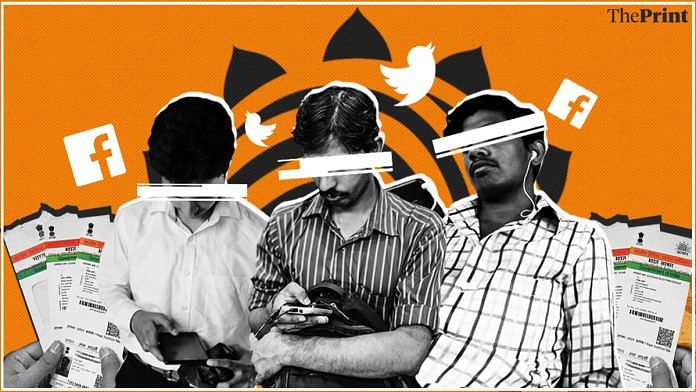The Supreme Court has cautioned against linking users’ social media accounts with Aadhaar, saying it will impinge on citizens’ privacy. Appearing for the Tamil Nadu government, Attorney General K.K. Venugopal said the move will help the authorities to check terror contents, fake news, and pornographic materials.
ThePrint asks: Linking Aadhaar to Facebook, Twitter: Possible witch-hunt or key to curb crime & fake news?
I filed the plea at Madras High Court because social media should be safe for everyone
 Antony Clement Rubin
Antony Clement Rubin
RTI activist, petitioner in Madras HC to link Aadhaar to social media accounts
I followed the correct procedure of going to the police to complain about the Facebook page that had posted derogatory comments about me. But nothing came out of it, so I moved the Madras High Court. I want ‘traceability’ not just on social media, but also on all utility-based service platforms like Gmail, Paytm, Ola, and Uber, etc.
When there is a crime, law agencies should be able to detect and stop it. As of now, you can create an anonymous page on Facebook, abuse anyone and get away with it. I have a serious problem with this.
The Madras High Court understood this and the fact that right to privacy should not be misused. The judges asked for other ways to detect the origins of a fake message. Professor Kamakoti of IIT Madras, also a member of the National Security Advisory Board, did suggest ways through which we can trace the origins of a message.
I feel strongly about the need to make the world of social media safe for everyone. There is a lot of cybercrime happening. Facebook in the US has a lot of money and that’s why they respond quickly whenever issues crop up there. But that is not the case in India.
I am a victim of abuse. How will I get redressal when I know that the perpetrator can do anything behind the veil of privacy?
When Beijing destroyed anonymity, even for free email, Google left China
 Prasanto K. Roy
Prasanto K. Roy
Policy professional and tech writer
When I come across vicious trolling online, I sometimes wonder about tracking the trolls. A few times, I try. Such as in the past week when a Kashmiri friend got violent rape threats after dog-whistling by a TV channel. I reported the handles and tried to track them down. But it’s mostly futile: they’re anonymous, and social platforms will at most suspend a handle, but never reveal contact details.
One answer lies in the plea before our courts today – link Aadhaar to social media accounts. The theory goes that with authentication, every handle’s identity is known, and you can trace trolls – a deterrent for violent trolling or criminal or even seditious behaviour.
Reality isn’t that simple. There’s the small matter of practicality – for various reasons, this simply cannot work. It will take forever, bringing the social platforms to a grinding halt (as forced KYC did to India’s mobile wallets last year). And the platforms are global, the trolls can be anywhere.
But the far bigger issue is the value of anonymity, which trumps the cons.
Social media has empowered people – like critics, dissident voices in dictatorships. Beijing crushed dissent partly by destroying anonymity – even for free email, a clash which triggered Google’s exit from China.
India’s Internet Freedom Foundation argues that less restrictive measures should be explored before requiring authentication that is likely to cause more harm than good. I agree. Forcing biometric authentication will destroy much of the value of social media. We need to arrive at better answers.
Also read: In Sushma’s footsteps, Nirmala Sitharaman gets tax dept to handle social media grievances
Linking Aadhaar to FB, Twitter could expose entire Aadhaar database to foreign countries & non-state actors
 Pavan Duggal
Pavan Duggal
Advocate, Supreme Court and expert in cyberlaw
I don’t think linking Aadhaar data with social media accounts is a good idea because it will lead to violation of people’s privacy. Another extremely important thing to note regarding users’ privacy is that many social media servers are outside the territorial boundaries of India. So, this means that people’s Aadhaar data will be both amenable and accessible to foreign states as well as non-state actors.
One must also understand that India still does not have a data localisation law. So, linking Aadhaar to social media accounts will potentially expose the entire database to foreign actors. And if anything does go wrong with Aadhaar data security, then the sovereignty and integrity of people’s personal data will be compromised.
The right to privacy also includes the right to anonymity. The right to anonymity can only be taken away by a procedure established under law. It will definitely lead to a witch-hunt against people as there would be no checks and balances in place. The proposal of the Tamil Nadu government has far more disadvantages than advantages.
Linking Aadhaar with social media accounts will curb both petty crimes and serious offences
 Vinit Goenka
Vinit Goenka
Ex National Co-Convener-IT Cell, BJP
In the current atmosphere where fake news is being circulated against the government, it is imperative to identify the people who are actually responsible for this menace. This includes cracking down on both citizens of India and social media platforms. So, there is a need to link social media accounts with either Aadhaar or passports. And since the country is moving towards adopting a single identification metric, linking social media accounts with Aadhaar becomes important. This is also required because email IDs andphone numbers can easily be changed.
With the technology of meta-tagging, it is possible to identify the author of a post: the person who writes the content for the first time. The amender of the post: who circulates it after tinkering with it. And the amplifier of the post: A fan who distributes the content. This will help law enforcement agencies clamp down on cybercrime.
Indians comprise one-sixth of the total number of users on social media and these portals earn billions of dollars by taking advantage of this. So, it is important that social media platforms have some servers in India.
Linking of Aadhaar with social media accounts will ensure that petty crimes such as bullying are curbed, and serious offences such as plotting against the State are detected early on.
Also read: Pakistani social media handles claim build-up at LoC, Indian Army says nothing alarming
Best way to check fake news and crime is to regulate KYC process when sim cards are issued
 Rakshit Tandon
Rakshit Tandon
Cyber Security Expert
Due to a prevailing threat to people’s privacy, the Supreme Court had declared in its September 2018 verdict that Aadhaar should not be made mandatory for bank accounts, school admissions, private corporations, etc. Facebook is not an Indian company, and so it should not be allowed access to Aadhaar data. And the fact that Facebook has maintained its opposition to this recommendation on technical grounds should provide more reasons to question what the Tamil Nadu government has suggested.
So, it will be better if the Indian government focuses on improving the KYC process while issuing sim cards to people. The real concern is how thousands of sim cards are issued to people with undisclosed or fake identities. Let us first monitor and regulate how our domestic telecom operators provide services.
To open accounts on social media platforms like Facebook, mobile numbers should be made mandatory.Now, if I open a Facebook account with my mobile number, then I already become a verified user. As an expert, I will not advise that Aadhaar details be given to Facebook for the purpose of verification. The best way to curb fake news is to revamp the procedure telecom operators use while issuing sim cards.
Madras High Court is not adjudicating on a question of law, but acting as a forum for policy-making
 Gurshabad Grover
Gurshabad Grover
Senior Policy Officer, Centre for Internet and Society
The proceedings in the Aadhaar and social media linkage case in the Madras High Court are very worrying. It is another example of how the courts are continuously expanding the scope of what is permitted as public interest litigation. In this case, the Madras High Court is not adjudicating on a question of law, but acting as a forum for policy-making.
Having said that, cybercrime is a legitimate problem. If law enforcement agencies are unable to investigate crimes, we need to think of other more effective legal instruments.
Unfortunately, even the measures that are being deliberated in the court are not identifying the root cause of these problems — retrieving
information from online platforms based outside India. And this could be a long and cumbersome process.
Instead of thinking about how India can sign bilateral agreements with other countries that can make the process for requesting legal information easier, an entirely unrelated solution is being given. It is in line with the worrying trend of the unchecked issues with the Aadhaar programme, which are now being used as a common excuse to refrain from looking at cases where criminal investigation is required. The solution misses the scope of solving the issue at hand entirely, and carries its own massive risks of infringing privacy and violating freedom of expression.
By Taran Deol and Revathi Krishanan




There are certainly lots of particulars like that to take into consideration. That is a great level to convey up. I supply the thoughts above as general inspiration however clearly there are questions just like the one you carry up the place an important factor shall be working in sincere good faith. I don?t know if finest practices have emerged around things like that, but I am positive that your job is clearly identified as a fair game. Both boys and girls really feel the influence of only a second’s pleasure, for the remainder of their lives.
India is suffering from LOW IQ – imagine allowing GOVT POLITICIANS who are the BIGGEST CLASS OF CRIMINALS on the Planet, who can easily CROWN THEMSELVES DICTATORS allowed to monitor & silence any of their victims
It destroys India & makes India a SLAVE STATE like China where the citizens are CATTLE to the POLITICIANS – the BJP wants the same thing. Aadhar has NO PLACE linked to Social Media, because if ANY CRIMINAL GOVT POLITICIAN victimizes you, you need to be able to get help via Social Media.
AAdhar is a success in India. It’s critics have double standard arguments. If India can have AAdhar, why not the world have unique ID for everybody. It will solve many problems of world crime. An honest person need not worry. It’s the criminals who will be running.
Given the power and reach of social media, each person who generates content on it should be genuine, traceable, accountable. How this can be done without impinging on individual privacy is for the authorities to determine. A concerted effort to crack down on fake news and material that incites violence and hatred would be widely welcomed. The police have their cyber crime units. They should make an example in some particularly egregious cases.